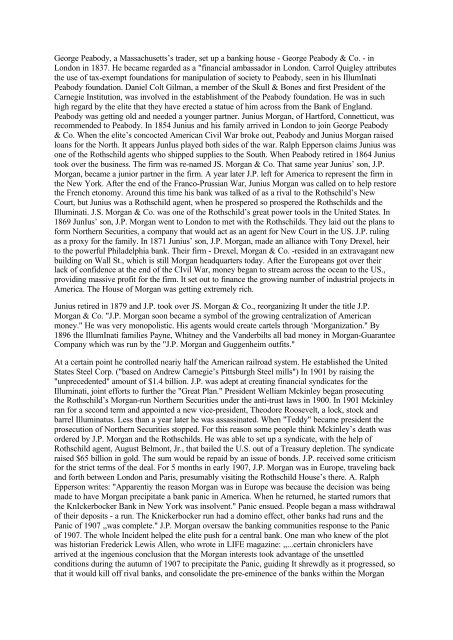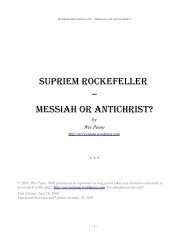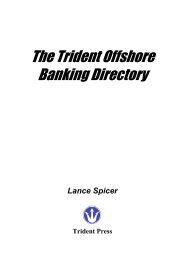Bloodlines of Illuminati
Bloodlines of The Illuminati - S pirit S elf
Bloodlines of The Illuminati - S pirit S elf
- No tags were found...
Create successful ePaper yourself
Turn your PDF publications into a flip-book with our unique Google optimized e-Paper software.
George Peabody, a Massachusetts’s trader, set up a banking house - George Peabody & Co. - in<br />
London in 1837. He became regarded as a "financial ambassador in London. Carrol Quigley attributes<br />
the use <strong>of</strong> tax-exempt foundations for manipulation <strong>of</strong> society to Peabody, seen in his IllumInati<br />
Peabody foundation. Daniel Colt Gilman, a member <strong>of</strong> the Skull & Bones and first President <strong>of</strong> the<br />
Carnegie Institution, was involved in the establishment <strong>of</strong> the Peabody foundation. He was in such<br />
high regard by the elite that they have erected a statue <strong>of</strong> him across from the Bank <strong>of</strong> England.<br />
Peabody was getting old and needed a younger partner. Junius Morgan, <strong>of</strong> Hartford, Connetticut, was<br />
recommended to Peabody. In 1854 Junius and his family arrived in London to join George Peabody<br />
& Co. When the elite’s concocted American Civil War broke out, Peabody and Junius Morgan raised<br />
loans for the North. It appears JunIus played both sides <strong>of</strong> the war. Ralph Epperson claims Junius was<br />
one <strong>of</strong> the Rothschild agents who shipped supplies to the South. When Peabody retired in 1864 Junius<br />
took over the business. The firm was re-named JS. Morgan & Co. That same year Junius’ son, J.P.<br />
Morgan, became a junior partner in the firm. A year later J.P. left for America to represent the firm in<br />
the New York. After the end <strong>of</strong> the Franco-Prussian War, Junius Morgan was called on to help restore<br />
the French etonomy. Around this time his bank was talked <strong>of</strong> as a rival to the Rothschild’s New<br />
Court, but Junius was a Rothschild agent, when he prospered so prospered the Rothschilds and the<br />
<strong>Illuminati</strong>. J.S. Morgan & Co. was one <strong>of</strong> the Rothschild’s great power tools in the United States. In<br />
1869 JunIus’ son, J.P. Morgan went to London to met with the Rothschilds. They laid out the plans to<br />
form Northern Securities, a company that would act as an agent for New Court in the US. J.P. ruling<br />
as a proxy for the family. In 1871 Junius’ son, J.P. Morgan, made an alliance with Tony Drexel, heir<br />
to the powerful Philadelphia bank. Their firm - Drexel, Morgan & Co. -resided in an extravagant new<br />
building on Wall St., which is still Morgan headquarters today. After the Europeans got over their<br />
lack <strong>of</strong> confidence at the end <strong>of</strong> the CIvil War, money began to stream across the ocean to the US.,<br />
providing massive pr<strong>of</strong>it for the firm. It set out to finance the growing number <strong>of</strong> industrial projects in<br />
America. The House <strong>of</strong> Morgan was getting extremely rich.<br />
Junius retired in 1879 and J.P. took over JS. Morgan & Co., reorganizing It under the title J.P.<br />
Morgan & Co. "J.P. Morgan soon became a symbol <strong>of</strong> the growing centralization <strong>of</strong> American<br />
money." He was very monopolistic. His agents would create cartels through ‘Morganization." By<br />
1896 the IllumInati families Payne, Whitney and the Vanderbilts all bad money in Morgan-Guarantee<br />
Company which was run by the "J.P. Morgan and Guggenheim outfits."<br />
At a certain point he controlled neariy half the American railroad system. He established the United<br />
States Steel Corp. ("based on Andrew Carnegie’s Pittsburgh Steel mills") In 1901 by raising the<br />
"unprecedented" amount <strong>of</strong> $1.4 billion. J.P. was adept at creating financial syndicates for the<br />
<strong>Illuminati</strong>, joint efforts to further the "Great Plan." President Welliam Mckinley began prosecuting<br />
the Rothschild’s Morgan-run Northern Securities under the anti-trust laws in 1900. In 1901 Mckinley<br />
ran for a second term and appointed a new vice-president, Theodore Roosevelt, a lock, stock and<br />
barrel Illuminatus. Less than a year later he was assassinated. When "Teddy" became president the<br />
prosecution <strong>of</strong> Northern Securities stopped. For this reason some people think Mckinley’s death was<br />
ordered by J.P. Morgan and the Rothschilds. He was able to set up a syndicate, with the help <strong>of</strong><br />
Rothschild agent, August Belmont, Jr., that bailed the U.S. out <strong>of</strong> a Treasury depletion. The syndicate<br />
raised $65 billion in gold. The sum would be repaid by an issue <strong>of</strong> bonds. J.P. received some criticism<br />
for the strict terms <strong>of</strong> the deal. For 5 months in early 1907, J.P. Morgan was in Europe, traveling back<br />
and forth between London and Paris, presumably visiting the Rothschild House’s there. A. Ralph<br />
Epperson writes: "Apparentiy the reason Morgan was in Europe was because the decision was being<br />
made to have Morgan precipitate a bank panic in America. When he returned, he started rumors that<br />
the KnIckerbocker Bank in New York was insolvent." Panic ensued. People began a mass withdrawal<br />
<strong>of</strong> their deposits - a run. The Knickerbocker run had a domino effect, other banks had runs and the<br />
Panic <strong>of</strong> 1907 ,,was complete." J.P. Morgan oversaw the banking communities response to the Panic<br />
<strong>of</strong> 1907. The whole Incident helped the elite push for a central bank. One man who knew <strong>of</strong> the plot<br />
was historian Frederick Lewis Allen, who wrote in LIFE magazine: ,,...certain chroniclers have<br />
arrived at the ingenious conclusion that the Morgan interests took advantage <strong>of</strong> the unsettled<br />
conditions during the autumn <strong>of</strong> 1907 to precipitate the Panic, guiding It shrewdly as it progressed, so<br />
that it would kill <strong>of</strong>f rival banks, and consolidate the pre-eminence <strong>of</strong> the banks within the Morgan




